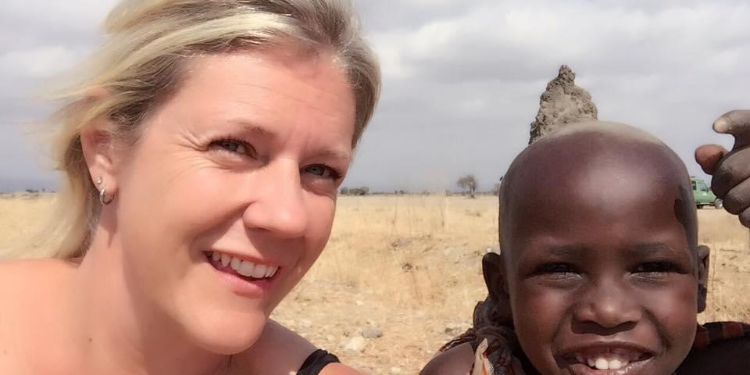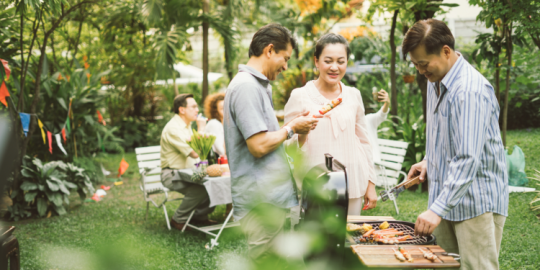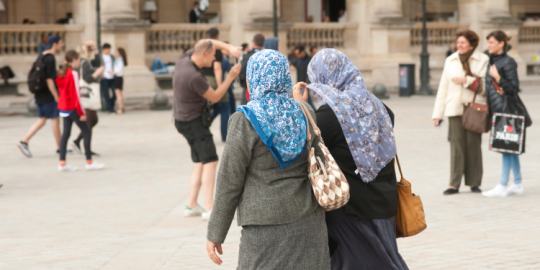Can you briefly introduce yourself and tell us about your background?
My name is Virginie Roux. I am 48, and I'm from Seine-et-Marne. I moved to the south of France, more precisely in the Gard, in April 2000. I have two daughters aged 19 and 22.
After a career as a social worker, I was at the head of a department managing human resources, logistics and occupational health and safety. But after 25 years in the public service, I decided to take a break. So this is how my adventure as an expatriate in Tanzania began.
What made you want to leave? Is this your first experience abroad?
Following an animal safari and my encounter with the local tribes seven years ago, I particularly appreciated the contact with the welcoming, warm and always smiling Tanzanian population. Although I had travelled to different countries previously, the relationship was different here. So I naturally came back a few months later as a volunteer in an orphanage for almost a month. I had to retake some English classes to communicate with the children easily (in Tanzania, the mother tongue is Swahili, but the classes are taught in English).
I met various people during this volunteering period, including Anna, a young receptionist in a small local hotel. Anna invited me to her wedding a few months later, that's how I met Kelvin.
We had a long-distance relationship, and in 2019, we finally decided to set up our small local safari agency, Kelvin being a safari guide. And we succeeded in doing so. At the beginning of 2020, I was making plans to leave France, but then Covid happened.
Tourism slowed down significantly, but our clients absolutely wanted to escape all this during their stay, so we resumed our activities at the end of August 2020 when international flights resumed. I travelled to Tanzania at the end of October 2020, just before the second lockdown in France. This is my first experience as an expat.
How long have you lived in Tanzania? What drew you to it?
I have now been living in the country for almost 15 months. The population, the landscapes and the wildlife, the "hakuna matata" way of life, my new job, the discovery of another culture and reuniting with Kelvin are at the origin of my move. My meeting with Kelvin is what triggered all this.
What were the main challenges you had when you arrived in Tanzania, and how did you overcome them?
I arrived in Tanzania with two suitcases of 23kg each. It's never easy to reduce your past life to two suitcases. I have cluttered my parents' garage with a few things that I bring back little by little during my round trips to France. Kelvin used to live in a tiny single room with his cousin. Luckily, I saw an ad for a local cottage on social media. Here, it's not difficult to rent accommodation since you don't need to present payslips, an employment contract or other guarantees. You just have to pay six months rent in advance, and you are the new tenant. We currently live in this small house in a popular district of Arusha, sharing the land with the owner. The integration into the neighbourhood was immediate, even if the "Mzungu" (the White) did not go unnoticed. We recently moved into a bigger house but still in a popular area of Arusha.
I didn't have any real challenges to overcome, just a few adaptations from my previous life: adapting to frequent and prolonged power cuts without being informed beforehand, learning to stock up on water and having a bath with a litre of water due to frequent water cuts and for several days, get used to driving on the left and looking on the right side before crossing the road, learning to pay for your electricity before consuming and paying via phone, getting used to an intense rainy season that can last from March to May, handwashing clothes, etc.
The living conditions here have taught us to live for the present moment. It is challenging to plan for the short or medium term. "Hakuna matata" has become my new philosophy; it can be interpreted as "take it easy".
Is Tanzania a welcoming country for expats?
Tanzania is a very welcoming country for expatriates (workers and investors), especially the island of Zanzibar. You then need to obtain a work permit and a resident permit if you wish to settle and work in the country.
Tanzanians are used to having a diverse community with people coming from India, China, Europe, etc. They are very welcoming, especially if you live in a popular neighbourhood. I integrated very quickly.
Tell us about your career. Did the pandemic have an impact on your business?
Today, I'm the director of a small safari company offering private stays in Tanzania. From social worker to head of human resources to the manager of a safari agency, I had to adapt. I was lucky to have the skills and experience. I am not a tourism professional, but I have been organizing my own trips for years, and the relationship with others is my core business. Quite naturally, we have created a great bond with our travellers who are looking for personalized trips. Having a French-speaking professional who can arrange tailor-made stays over a phone call, our presence before/during and sometimes even after the stay, if we get along well, helps our travellers feel confident, and this makes them live a unique adventure like never before. I only offer programs that I have tested myself, and I regularly go on safaris with our travellers, which allows me to constantly check the quality of our accommodation partners, for example.
Tourism, in general, has been strongly impacted by the global health crisis. From March to August 2020, the international flights' ban had completely stopped our activity. However, since September 2020, we have been able to resume our activities and grow our business slowly. We must admit that we were lucky compared to other countries still closed to tourism.
Are there opportunities for expats in Tanzania? In what areas and what advice would you give them?
Tourism is a great opportunity to move to Tanzania, including the island of Zanzibar, for those who dream of nature, beautiful spaces and above all, a different pace of life.
However, there is strong competition, with, for example, thousands of safari companies in the north of the country and hundreds of accommodations in Zanzibar. I would therefore say that it's going "pole pole" (slowly and smoothly). But my advice is to be certain of the viability of your expat project before moving. Don't just quit your job to start a brand new life here. It is also necessary to have a perfect knowledge of Tanzanian regulations for setting up a business as an expat, purchasing land or property, and taxes.
Finally, consider and evaluate the offer, and what added value you can bring. Our assets, for example, are a close follow-up of our travellers and authentic and original encounters with local populations (even immersion in a tribe for those who wish to live a humanly enriching experience). Of course, being passionate about what you do and the country is essential.
What about social life in Tanzania? What restrictions are in place, and how are you coping with them?
There are no health restrictions here. The only thing we do is respect the barrier gestures in public places. We are lucky in the north of the country, where I live, to have large spaces, naturally ventilated houses/huts and a climate allowing us to enjoy the outdoors.
My social life here is therefore not affected by the health crisis. It's quite challenging to introduce a health pass requirement in a country where access to the vaccine is still quite limited.
What does your daily life as an expat in Tanzania look like?
Most of my daily life is filled with my professional activity. I work every day, with longer hours than in France since our travellers can arrive at 11 p.m. or prospective customers can only be reached on weekends or late at night (especially when we have a two-hour time difference with France in wintertime).
The big difference with my job as a civil servant is that I don't have to go to the office every day of the week. I work when I want but especially from where I want. This nomadism lifestyle is very comfortable for me, and I love being able to prepare a quote in the evening after a safari in the Serengeti, for example, amid the wild fauna.
However, I like to give myself half a day to go do my shopping at the local market or accompany our travellers to the small school/orphanage that we support, our family coffee plantation for a local lunch and to roast coffee or to go canoeing on a small lake near Arusha.
Is there one thing you miss from your home country, especially in the pandemic context?
I miss people my daughters, my family and my friends, of course. But for the moment, I don't miss any specific thing besides good French cheese and olive oil. But we have extraordinary travellers who often come with a typical gift from France (wine, cheese, etc.).
The pandemic did not prevent me from returning to France and coming back to Tanzania whenever I wanted.
If you could start from scratch, is there anything you would do differently?
I wouldn't change anything. Everything happened in perfect timing in my personal and professional life. My daughters were old enough and independent enough for me to consider my expatriation calmly; my maturity and professional
experience were sufficient to take the step of embarking on a new adventure, on my own, after years of civil service.
What are your plans for the future?
We want the company to grow a little more while remaining on a human scale to keep this proximity to our travellers. We are also looking to build a small eco-lodge (near our future home) so that I can calmly satisfy my needs and my desire to meet our travellers before and after their safari.
Besides, we have the project to create a small school with the help of volunteers. But I can't say more for now.
















